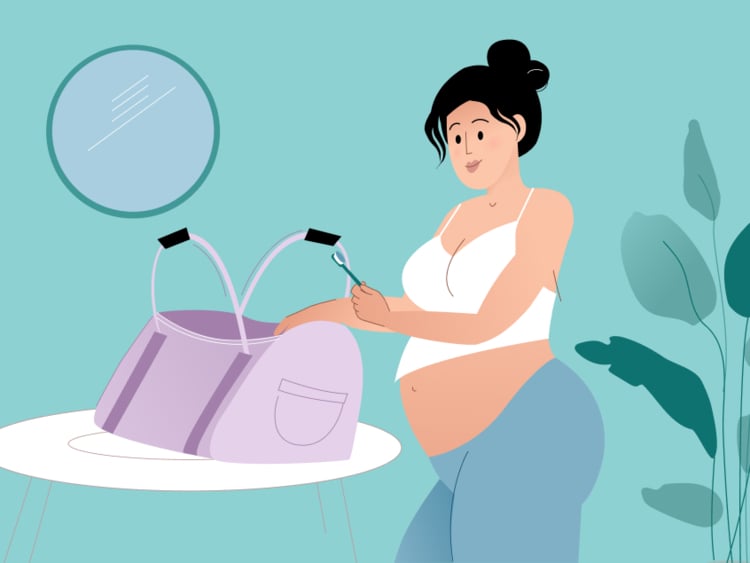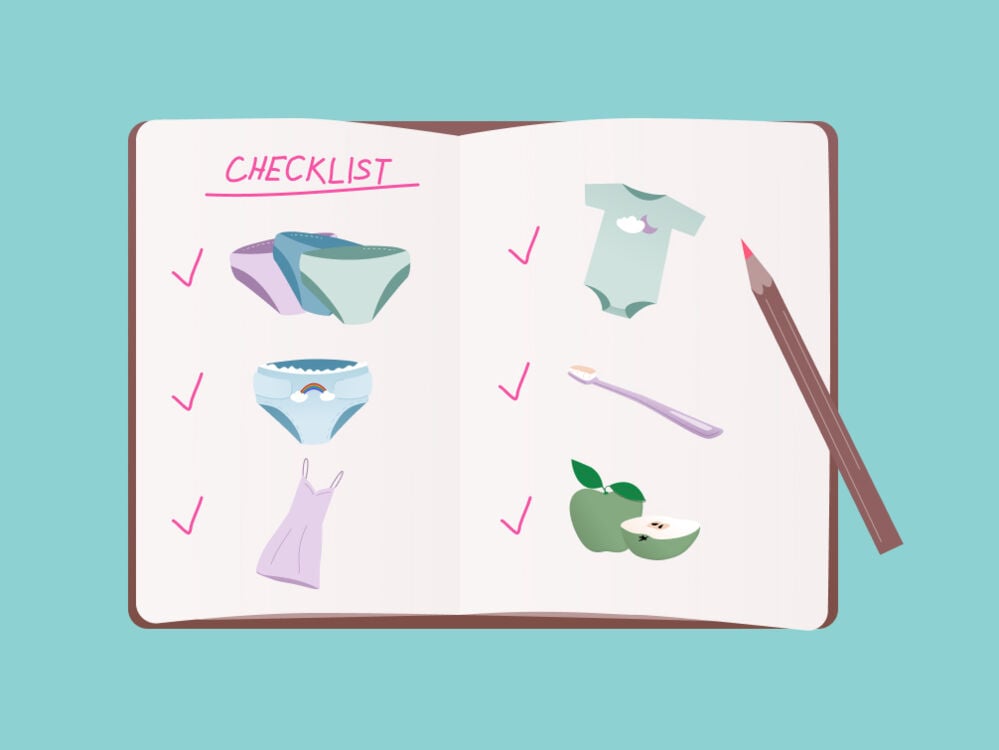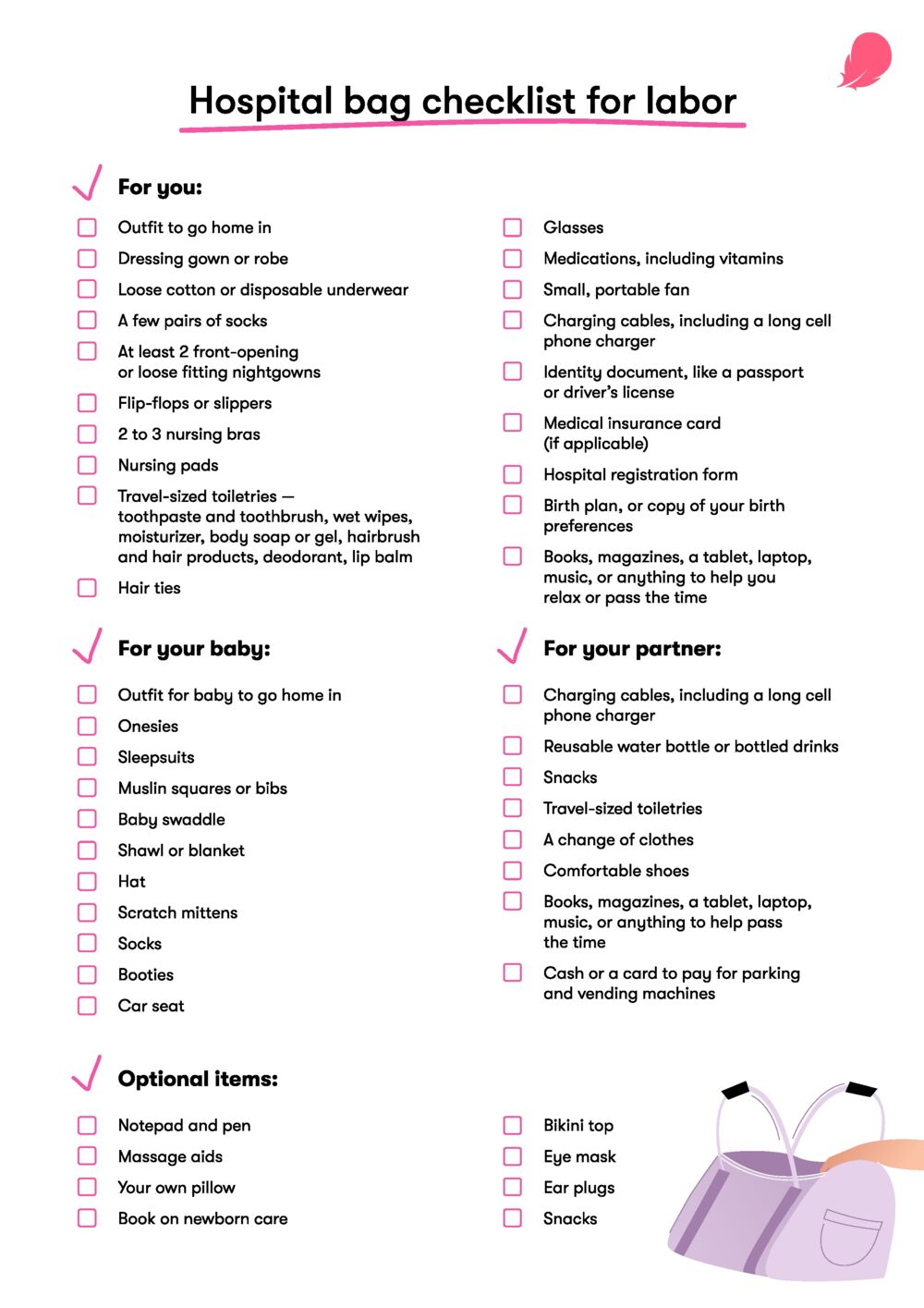Packing your hospital bag can feel overwhelming. But with this checklist, you can check off everything you need for mom, baby, and partner during (and after) labor.
-
Tracking cycle
-
Getting pregnant
-
Pregnancy
-
Help Center
-
Flo for Partners
-
Anonymous Mode
-
Flo app reviews
-
Flo Premium New
-
Secret Chats New
-
Symptom Checker New
-
Your cycle
-
Health 360°
-
Getting pregnant
-
Pregnancy
-
Being a mom
-
LGBTQ+
-
Quizzes
-
Ovulation calculator
-
hCG calculator
-
Pregnancy test calculator
-
Menstrual cycle calculator
-
Period calculator
-
Implantation calculator
-
Pregnancy weeks to months calculator
-
Pregnancy due date calculator
-
IVF and FET due date calculator
-
Due date calculator by ultrasound
-
Medical Affairs
-
Science & Research
-
Pass It On Project New
-
Privacy Portal
-
Press Center
-
Flo Accuracy
-
Careers
-
Contact Us
Hospital bag checklist: Everything you need to pack for labor


Every piece of content at Flo Health adheres to the highest editorial standards for language, style, and medical accuracy. To learn what we do to deliver the best health and lifestyle insights to you, check out our content review principles.
Getting ready for a baby requires a lot of preparation. You’ve been told your due date, you’ve had your ultrasounds, and your hospital bag is one of the final steps in the process. But what should you pack for labor and the days afterward, and what’s best left at home?
With so much to think about before your bundle of joy arrives, we asked obstetrician and gynecologist Dr. Jennifer Boyle for her expert advice on what to pack in your birthing hospital bag — whether you’re having a cesarean section or a vaginal birth — so it’s one fewer thing to stress about.
If you’re looking for a baby’s hospital delivery bag checklist or a checklist for mom, dad, or partner, we share everything you need to know. Plus, you can download our handy printable hospital bag checklist PDF if you keep scrolling.
What week should you pack your hospital bag?
Preparation is key, right? While Dr. Boyle says there’s not really such a thing as packing too soon, she advises pulling together your hospital bag when you’re 36 weeks pregnant. “As you get closer to giving birth, you’ll have a better sense of what you really need and what will help you the most,” she says. “However, people who are at an increased risk of having a premature birth should start packing a little sooner. This would include anyone who is pregnant with multiples, like twins or triplets, or who has had a prior preterm birth,” she adds.
“Some labors start slowly with lots of early contractions, and although you would have plenty of time to pack during this early stage, it’s still nice to have everything ready to go so that you can focus on staying comfortable during early labor,” Dr. Boyle explains. “Other labors, especially if you have already had a baby, can start quickly, so having your bags ready to go is super helpful.”
Even if you’re planning a home birth, Dr. Boyle still suggests having a newborn hospital bag packed and ready to go, just in case you need to go to the hospital unexpectedly.
What to pack in a hospital bag for labor
Below, we’ll run through essential things to pack for mom and baby, things another parent or partner might need, and some optional items that could make your experience more comfortable. We’ll also detail what the hospital will typically provide while you’re in labor so you won’t need to worry about packing that.
Of course, every birthing hospital bag will be different based on your personal needs and the country where you’re giving birth, so pack according to your situation. Dr. Boyle also notes that every hospital has different policies and provisions. If you have any questions about what will be supplied, reach out to your health care provider to ask.

Take a quiz
Find out what you can do with our Health Assistant
Hospital bag checklist for mom:
- Outfit to go home in (something that felt comfortable at about six months pregnant)
- Dressing gown or robe
- Loose cotton or disposable underwear
- A few pairs of socks
- At least 2 front-opening or loose-fitting nightgowns
- Flip-flops or slippers (if you prefer your own over the ones the hospital will provide)
- Bikini top (if you’re opting for a water birth and you’d prefer to wear one)
- 2 to 3 nursing bras
- Nursing pads (your milk usually hasn’t fully come in to need these, but it’s worth being prepared)
- Travel-sized toiletries — toothpaste and toothbrush, wet wipes, moisturizer, body soap or gel, hairbrush and hair products, deodorant, lip balm
- Hair ties
- Labor massage oil
- Glasses (if you need them, even if you usually wear contact lenses)
- Medications, including vitamins (in case labor is long or becomes complicated, leading to a prolonged stay at the hospital — but this should be packed at the last minute so you remember to continue taking your medication regularly while still at home)
- Small, portable fan
- Charging cables, including a long cell phone charger
- Identity document, like a passport or driver’s license
- Medical insurance card (if applicable)
- Hospital registration form
- Birth plan or copy of your birth preferences
- Books, magazines, a tablet, laptop, music, or anything to help you relax or pass the time
Baby’s hospital bag checklist:
- Outfit for baby to go home in
- Onesies
- Sleepsuits
- Muslin squares or bibs
- Shawl or blanket
- Hat
- Scratch mittens
- Socks
- Booties
- Car seat (left in your car, of course)
Some items for both mom and baby that may be provided by the hospital in the United States (but not in the United Kingdom or elsewhere) are:
- Postpartum pads to go home with
- Diapers and wipes
- Disposable underwear
- Formula (there may not always be facilities to prepare bottles, so look for liquid starter packs)
- Breast pump
- Towels
- Baby swaddles
- Blood pressure cuff (if you need to closely monitor your blood pressure at home)
Partner’s hospital bag checklist:
- Charging cables, including a long cell phone charger
- Reusable water bottle or bottled drinks
- Snacks
- Travel-sized toiletries
- Layers of clothing (this can be a long, intense experience, so avoid heavy or warm clothes that could increase the risk of fainting)
- A change of clothes
- Comfortable shoes
- Swimsuit (if they plan to help you shower during labor)
- Books, magazines, a tablet
- Cash or a card to pay for parking and vending machines
- A camera with batteries and a memory card, if you prefer this over your cell phone. However, check with the hospital if they allow filming of the actual birth moment, as some don’t.
Optional hospital bag checklist items:
- Favorite snacks
- Notepad and pen
- Massage aids
- Your own pillow
- Book on newborn care
- Eye mask
- Ear plugs
Printable hospital bag checklist
If you love checking things off a physical list or just want a hospital bag checklist for labor you can carry with you, this printable PDF could come in handy (just right click, open the image in a new tab, and print from there):

What not to include in your hospital bag
If Dr. Boyle has one piece of advice, it’s to not overpack: “You will have to bring home anything you take into the hospital or birth center, plus a baby!” she says. “You will be more tired and sore than when you arrive too.”
“Every outfit of your own that you wear while in the hospital is something that you’ll have to add to your laundry when you get home, but hospitals will take care of their own gowns and provide a lot of what you need,” she says.
Consider leaving the following items at home:
- Jewelry or other valuables
- Large sums of money
- Postpartum pads for your stay (if you live somewhere where hospitals provide enough for the full duration of your stay — you can ask about this in advance)
- Gifts for older siblings (these are best given when you bring the baby home)
- Swaddle blankets for baby (the hospital will have these, but do remember clothes to take the baby home in)
Hospital bag checklist: The takeaway
With all the above items in your hospital bag, you should have everything you need during the birth. Finally, Dr. Boyle encourages parents-to-be not to stress about having everything planned and packed perfectly: “Most new parents realize pretty quickly that newborns really don’t need that much. If you forget something, it will be OK.”


Hey, I'm Anique
I started using Flo app to track my period and ovulation because we wanted to have a baby.


The Flo app helped me learn about my body and spot ovulation signs during our conception journey.


I vividly
remember the day
that we switched
Flo into
Pregnancy Mode — it was
such a special
moment.
Real stories, real results
Learn how the Flo app became an amazing cheerleader for us on our conception journey.
References
“Pack Your Bag for Labour.” NHS, www.nhs.uk/pregnancy/labour-and-birth/preparing-for-the-birth/pack-your-bag-for-labour/. Accessed 23 Aug. 2022.
“What You Should Bring.” Mayo Clinic Health System, www.mayoclinichealthsystem.org/locations/barron/services-and-treatments/birthing-centers/getting-ready-for-baby/what-you-should-bring. Accessed 23 Aug. 2022.
History of updates
Current version (21 September 2022)
Published (30 November 2018)
In this article

Get your personal guide to pregnancy with the Flo app
-
Follow your baby's growth week by week
-
Get expert info on symptoms, safe foods, and more
-
Chat with other parents-to-be




